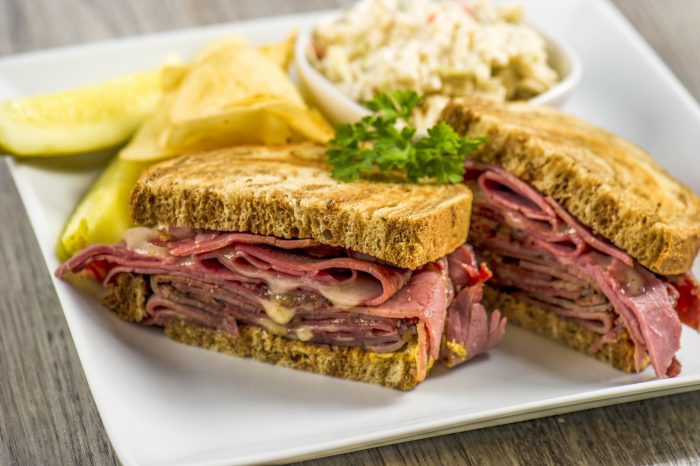By Leah S. Dunaief

One of the first things we noticed when we moved from the Bronx to Wichita Falls Texas, where my husband reported for duty on the Air Force base in July 1967, was that the city had no delis. Really, no delis. “Where can we find a deli?” we asked people. “What’s a deli?” was the response.
It was then that we learned that a deli, short for delicatessen, was indigenous to large urban settings generally found on the coasts, that made fresh sandwiches and sold side salads from their display cases and bottled sodas from their glass-front, vertical refrigerators. We explained that they were mighty convenient for a quick take-out lunch. Sometimes a few people ate at the handful of tables, but mostly it was an in-and-out experience and one hoped the line would not be too long. “We have diners,” they offered helpfully. “You could probably take out an order from one of them.”
How to describe the difference between a diner and a deli? I had never thought about delis before. I just knew there was one every couple of blocks in New York. Some of them were quite elegant, with imported products, cured meats and cheeses, and even exotic foods, while others, in the neighborhoods, just sold the usual turkey, bologna or ham and Swiss on a roll or white bread.
Ah, but then there were the kosher delis, the ones with overstuffed pastrami on rye and spicy mustard, with a pickle and a soda, maybe even a potato knish on the side. That’s the classic New York deli sandwich. They were the best, and there were fewer of those but enough to feed the discriminating in all five boroughs. Often kosher delis were part of a restaurant in which diners could sit at tables and be served by wise-cracking waiters. Patrons might slurp up chicken soup before they attacked their fulsome sandwiches.
In fact, there were 1500 kosher delicatessens in New York City in the 1930s, brought here primarily by German-Jewish immigrants in the late 19th century. There were fewer than 15 as of 2015, and I’ll bet there are only a handful today. This is how they started, or so the story goes.
A Lithuanian named Sussman Volk, who arrived in New York in 1880, owned a butcher shop on the lower East Side. He befriended another immigrant, from Romania, and allowed the fellow to store his meat in the shop’s large icebox. To thank him, the friend gave Volk a recipe for pastrami, which then proved so popular with Volk’s customers that he opened a restaurant at 88 Delancey Street and served the meat on rye. The creation was soon repeated in delis and became the city’s iconic sandwich.
Delicatessens originated in Germany during the 18th century, started by a German food company called Dellmayr in 1700 that still exists, and spread to the United States in mid-19th century. They catered to the German immigrants, offering smoked meats, sausages, pickled vegetables, dips, breads and olives. Just in case you are on “Jeopardy!”, the root of the word comes from the Latin, “delicatus,” meaning giving pleasure, delightful, pleasing. After WWII, from about 1948 on, they were simply referred to as “delis.”
Today, even supermarkets have deli sections. There are two delis within walking distance in my village and more up and down the neighboring villages. And they exist in many countries with slight variations on the theme. Australia, Canada, Europe (Milan, Paris, Vienna, London, Munich, Zurich), Ireland, they all have delis. They are different from Subway or Jersey Mike’s, or Wawa, which, too, make sandwiches to order. They are also different from McDonald’s or Wendy’s, who specialize in fast food. Some of them have hot prepared foods as well, and all of them require interaction with a clerk behind the counter as opposed to a more digital ordering process. Those clerks may whip up an egg on a roll with bacon and cheese if you ask. Some delis even have small groceries attached to them.
Delis are generally unpretentious eateries that welcome you. For my lunch tastes, you can’t spell delicious without “deli.”







